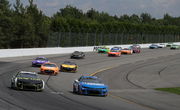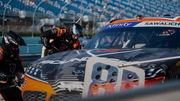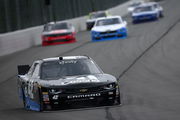
via Imago
Credit – Imago

via Imago
Credit – Imago
A single decision can change the course of a NASCAR season. In 2024, Kyle Larson’s choice to skip the Coca-Cola 600 and race in the Indianapolis 500 triggered a whirlwind of controversies. NASCAR granted him a playoff waiver, ensuring he remained postseason-eligible despite missing a major race. The decision sparked heated debates. Was it fair, or had NASCAR opened Pandora’s box?
Fast forward to 2025, and NASCAR isn’t taking any chances. The newly introduced waiver rule strips playoff points from drivers who miss races for non-medical reasons. Drivers like Ryan Blaney see it as a necessary move to maintain order, ensuring consequences for egregious actions on and off the track. But will it bring more discipline or unintended chaos?
ADVERTISEMENT
Article continues below this ad
Ryan Blaney sees order being restored with NASCAR’s stricter guidelines
Bob Pockrass’ recent tweet featuring Ryan Blaney sparked a conversation among NASCAR fans about the new “Larson Rule,” as part of the 2025 rule changes. The short clip showcased Blaney’s take on NASCAR’s updated waiver policy, which strips playoff points from drivers suspended for reasons other than medical emergencies. Blaney believes the rule is a step in the right direction, adding that it could deter drivers from engaging in retaliation or race manipulation. The policy aims to restore order and reinforce consequences for unsportsmanlike behavior.
Ryan Blaney elaborated on his thoughts in the video, saying, “Hopefully it puts that into people’s heads, you know, consequences. If you do something very egregious to where it calls for, you know, you getting suspended for a race, then it’s a pretty big deal.” He added that having clear-cut rules like these would make drivers think twice before acting out. According to Blaney, the rule is more about creating structure and fairness on the track than anything else.
NASCAR’s updated waiver policy came after the playoff drama surrounding Kyle Larson’s waiver in 2024. Under the new guidelines, drivers can no longer retain their playoff points if they are suspended for non-medical reasons. They will enter the postseason with only the base 2,000 points, which can drastically reduce their chances of advancing. The rule intends to remove ambiguity and provide a clear framework for when waivers are granted.
Ryan Blaney hopes the new waiver rule that strips drivers of all playoff points unless it’s a health reason (so a driver who is suspended would start playoffs with 2,000 points instead of 2,000 + playoff points earned) makes drivers think twice about potential acts: @NASCARONFOX pic.twitter.com/2LpeBOboPE
— Bob Pockrass (@bobpockrass) February 11, 2025
What’s your perspective on:
Is NASCAR's 'Larson Rule' a fair move, or does it unfairly punish aggressive drivers?
Have an interesting take?
Ryan Blaney’s support for the change echoes what many in the NASCAR community have been saying for a while. By eliminating the possibility of keeping accumulated points after a suspension, NASCAR aims to prevent scenarios that could compromise the competitive integrity of the playoffs. “Maybe we won’t see some manipulation stuff like you saw,” Blaney remarked, referring to previous incidents that drew scrutiny from fans and officials alike.
ADVERTISEMENT
Article continues below this ad
For now, it remains to be seen how this rule will affect the 2025 season and beyond. Drivers must weigh every decision carefully, knowing the stakes are higher than ever. While the Daytona 500 kicks off the new season, all eyes will be on how this policy plays out and whether it truly delivers on its promise to restore order to the sport.
Trending
The new “Larson Rule” also puts aggressive drivers on notice
NASCAR’s new waiver policy isn’t just about medical exemptions. The impact that sanctions will have on aggressive driving is revolutionary. Drivers who were suspended for retaliation in the past were able to return with their playoff points unaltered. This regulatory change, however, eliminates that loophole. Drivers who intentionally retaliate or act recklessly will forfeit all of their accrued playoff points if they are suspended.
ADVERTISEMENT
Article continues below this ad
One of the best examples is Lap 186 of the 2023 Coca-Cola 600. Chase Elliott retaliated by snagging Denny Hamlin’s car, which caused it to crash into the barrier after Hamlin shoved Elliott into the wall. Elliott received a one-race suspension. Many people thought the punishment was light. Under the new policy, however, Elliott would have forfeited all his playoff points. As a result, he would have been severely disadvantaged for the remainder of the season. This rule shift serves as a warning to aggressive drivers across the board.
In the end, NASCAR’s message is unambiguous: order and discipline are once again the main priorities. The stakes for every race are higher. Retaliation is becoming more than just a short-term setback; it has the potential to ruin a whole season. For aggressive drivers, it’s time to think twice before making a move that could end their title hopes in an instant.
ADVERTISEMENT
ADVERTISEMENT
ADVERTISEMENT
ADVERTISEMENT







Is NASCAR's 'Larson Rule' a fair move, or does it unfairly punish aggressive drivers?